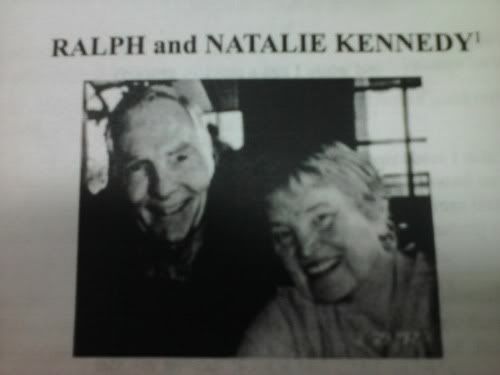Up until the 1960s, it was very difficult for minorities to get housing in Fullerton because of racist housing policies. The recently-published book A Different Shade of Orange: Voices of Orange, County, California Black Pioneers discusses this historical reality.
Two local people who were actively involved in championing the cause of fair and open housing were Ralph and Natalie Kennedy. As early as the 1950s, they were distributing open-housing petitions to prevent housing discrimination. Natalie recalls, “There was a Chinese family trying to move in about six houses from us. There was a deed restriction that...made it so minorities would not be welcome...so we got a petition going all around our neighborhood. Everybody signed it and they got in. That was very early. That was in the fifties.”
Ralph and Natalie continued getting signatures for an open housing petition for the city of Fullerton, trying to raise awareness and to help change a social climate of racism.
In 1963, the State of California passed the Rumford Fair Housing Art, “which made it illegal to discriminate in the area of housing against ethnic minorities and races.”
In response, a large group of the wealthy elite (banks and property owners and real estate agents) got an initiative on the ballot (Prop 14), which would repeal the Fair Housing Act. This coalition was operating under the racist mentality that minorities drive down property values. To them, making a lot of money was more important than making a just society. These groups and individuals remind me of the powerful corporate conglomerate called Magnum Opus, Incorporated in Kurt Vonnegut’s novel The Sirens of Titan: “It was a marvelous engine for doing violence to the spirit of thousands of laws without actually running afoul of so much as a city ordinance.”
With this massive corporate backing, Prop 14 passed. However, it was later declared unconstitutional.
Unfortunately, many property owners, ever the clever capitalists, found ways to subvert the Fair Housing Act. Ralph describes this trend that still continues today and explains why Fullerton is still largely segregated: “They got the idea that maybe we can’t overtly refuse to sell to somebody, but we can make sure that they don’t build any housing in Orange County that’s affordable to relatively poor people, many of whom are going to be ethnic minorities. So in this indirect manner, the society in general was able to continue this discriminatory effect." Even today, Fullerton has very little affordable housing. The proposed development on West Coyote Hills is typical Orange County: very expensive, exclusive housing.
Ralph and Natalie continued to work for fair housing for minorities. They were instrumental in creating the Fullerton Fair Housing Council, the first of its kind in Orange County, which later became part of the Orange County Fair Housing Council, which helped thousands of formerly-excluded minorities to find homes in Orange County.
Ralph, the campus minister at Cal State Fullerton, became president of the Presbyterian Interracial Council, which worked to end housing discrimination, school discrimination, and exploitation of farm workers. He started the Friends of the Farm Workers of Orange County. Ralph was arrested for peacefully taking part in a farm worker strike in Northern California.
As if all that was not enough, Ralph also founded and edited The Fullerton Observer, the only independently-run, family owned newspaper in Fullerton, which still exists today, helmed by Ralph and Natalie’s daughter Sharon.
When asked in an interview why he did all this for his community, why he gave so tirelessly and creatively for so many years, he responded, “The reason I do this, and Natalie would probably have a similar reason, because it comes out of our faith, faith in the idea of love and the idea that love is best evidenced by serving your fellow man in whatever kind of difficulty they may be in.”
Natalie echoed this sentiment: “Live simply that others may simply live.”

